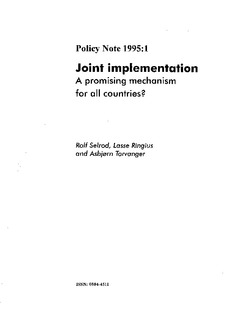Joint Implementation: A promising mechanism for all countries?
Working paper
Permanent lenke
http://hdl.handle.net/11250/191860Utgivelsesdato
1995Metadata
Vis full innførselSamlinger
- CICERO Policy Notes [65]
Sammendrag
The United Nations Framework Convention on Climate Change establishes no legal commitments for any of the Parties to reach specific targets of reduced greenhouse gas emissions. Although the Convention emphasizes the importance of immediate action by the industrialized countries, it is also weak with respect to incentives for the industrialized countries to take the lead in fighting global warming.
The way in which costs and benefits are distributed between countries is essential for mobilizing collective action. For many political and economic reasons, the best international policies are those that are cost-effective and are perceived as fair. This paper focuses on attractive implementation measures, in particular the mechanism of Joint Implementation established under the Climate Convention. Before it is concluded whether Joint Implementation is an useful and promising mechanism, it is necessary to understand the motives behind it, the opportunities for common benefits, as well as the need for equitable rules and regulations. Accordingly, this paper analyses a number of cost and benefit issues with regard to this mechanism, in a situation in which the Annex II countries have legally binding commitments, a situation which might become true in a near future. It is concluded that Joint Implementation under certain circumstances is an effective and attractive instrument for reducing global greenhouse gas emissions. Joint Implementation may also create an opportunity to assist a large number of countries in becoming more energy-efficient and in promoting a sustainable development. However, it is essential that potential problems concerning proper selection of Joint Implementation projects, uncertain abatement effect and consideration of strategic behavior and incentive problems be addressed in an efficient manner. To that end incentive correcting contracts, and adequate monitoring and verification capabilities, must be developed.
